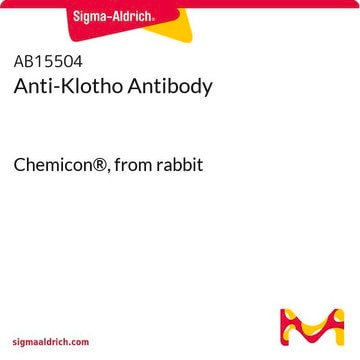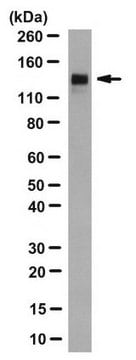MABN2398
Anti-Klotho Antibody, clone KL-115
clone KL-115, from rat
Szinonimák:
EC: 3.2.1.31, KL
About This Item
IHC
IP
WB
immunohistochemistry: suitable (paraffin)
immunoprecipitation (IP): suitable
western blot: suitable
Javasolt termékek
biológiai forrás
rat
antitest forma
unpurified
antitest terméktípus
primary antibodies
klón
KL-115, monoclonal
faj reaktivitás
human
kiszerelés
antibody small pack of 25 μL
technika/technikák
immunocytochemistry: suitable
immunohistochemistry: suitable (paraffin)
immunoprecipitation (IP): suitable
western blot: suitable
izotípus
IgG2aκ
NCBI elérési szám
UniProt elérési szám
célzott transzláció utáni módosítás
unmodified
Géninformáció
human ... KL(9365)
Általános leírás
Egyediség
Immunogén
Alkalmazás
Neuroscience
Immunocytochemistry Analysis: A represetative lot detected Klotho in Immunocytochemistry applications (Maltare, A., et. al. (2014). Monoclon Antib Immunodiagn Immunoother. 33(6):420-7).
Immunoprecipitation Analysis: A represetative lot immunoprecipitated Klotho in Immunoprecipitation applications (Maltare, A., et. al. (2014). Monoclon Antib Immunodiagn Immunoother. 33(6):420-7).
Minőség
Western Blotting Analysis: A 1:1,000 dilution of this antibody detected Klotho in 10 µg of human kidney tissue lysates.
Cél megnevezése
Fizikai forma
Tárolás és stabilitás
Egyéb megjegyzések
Jogi nyilatkozat
Nem találja a megfelelő terméket?
Próbálja ki a Termékválasztó eszköz. eszközt
Analitikai tanúsítványok (COA)
Analitikai tanúsítványok (COA) keresése a termék sarzs-/tételszámának megadásával. A sarzs- és tételszámok a termék címkéjén találhatók, a „Lot” vagy „Batch” szavak után.
Már rendelkezik ezzel a termékkel?
Az Ön által nemrégiben megvásárolt termékekre vonatkozó dokumentumokat a Dokumentumtárban találja.
Tudóscsoportunk valamennyi kutatási területen rendelkezik tapasztalattal, beleértve az élettudományt, az anyagtudományt, a kémiai szintézist, a kromatográfiát, az analitikát és még sok más területet.
Lépjen kapcsolatba a szaktanácsadással








